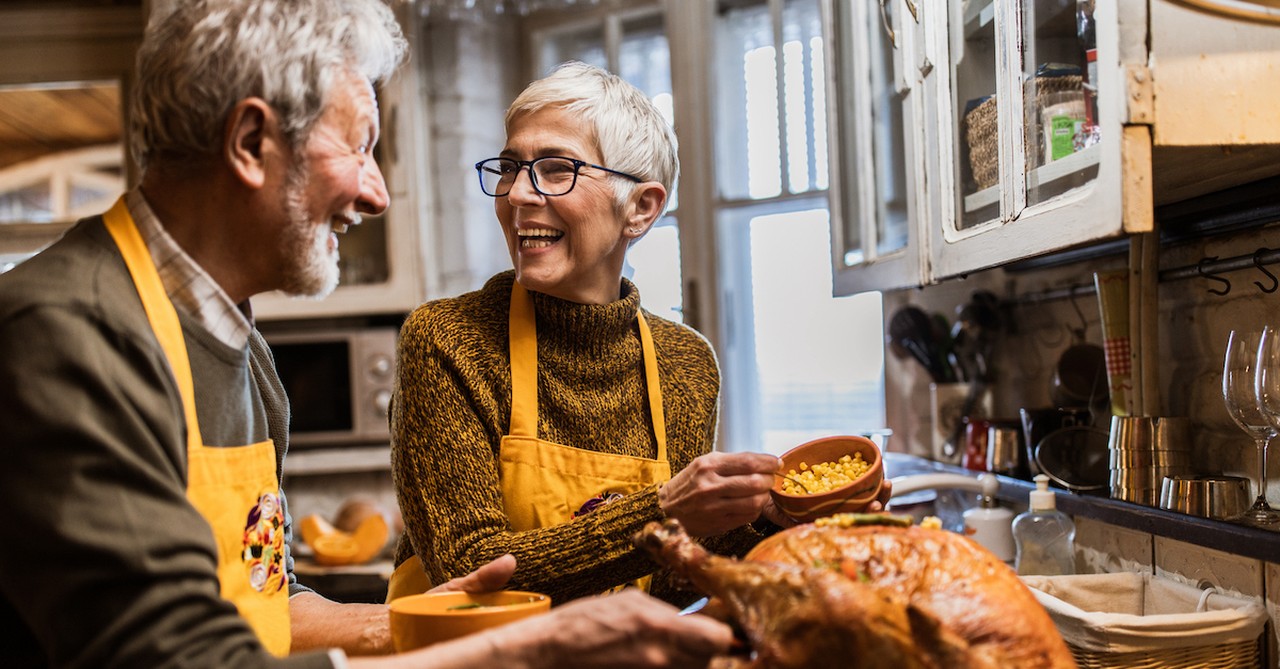
Most of us are no strangers to difficult conversations with family members on Thanksgiving. Sadly, many family members think they have an unlimited pass to ask us any and every question about our lives. This can cause family members to ask many questions that we wouldn't want them to ask us in a public setting. A few questions we often hear is, "Why haven't you gotten married yet? Why haven't you had kids? Did you gain weight? Did you lose weight?"
All of these questions can lead to very stressful conversations. Even though our family members might mean well, we do have the right to shut down any conversation that we are uncomfortable with. If a conversation or question is uncomfortable, you don't have to answer it or engage with it. Just because they are family doesn't mean they can ask you these types of questions or make unnecessary comments.
If you are dreading the annual Thanksgiving family get-together, consider a few ideas for handling difficult conversations that might come your way. Below are six ways to do just this.
1. "No" Is a Complete Sentence

1. "No" Is a Complete Sentence
SLIDE 1 OF 6
If a family member approaches you with a difficult conversation and you don't have the bandwidth to talk about it, remember that "no" is a complete sentence. You can turn down any conversation or any question. You are not obligated to talk with anyone about anything you don't want to talk about. Family members should respect this and take notice of your boundaries.
For example, if your aunt wants to talk to you about how she was already married when she was your age and you have already heard this conversation many times, it has affected your self-view, and you feel badly about your future because of this conversation, then you have every right to say, "No, I don't want to have this conversation with you right now." After you say this, walk away and continue to enjoy your Thanksgiving celebration. Retain your peace and choose to be peaceful, kind, and calm in your interactions with others (James 3:18).
2. Walk Away

2. Walk Away
SLIDE 2 OF 6
Sometimes, the best thing to do is walk away. If the conversation is too difficult and not workable right now, you might need to just walk away from the situation. From personal experience, staying and trying to "stick it out" can lead to worse problems. If you stay and try to go through with the conversation, you could lose your temper, become offended, or hurt by what the difficult family member has to say. Therefore, if you want to avoid these potential problems, walking away might be beneficial for your overall well-being.
Try to remember that you don't have to sacrifice your own well-being for difficult family members. Sadly, many difficult family members are going to be problematic no matter what we try to do. Trying to work through issues with them or trying to make them understand our feelings can be futile. Sometimes, family members just are not supportive to us and only leave us feeling drained.
While we are to be kind, caring, and loving to everyone, we are not called to be doormats. If you ever feel like someone is treating you like a doormat, you have the right to say how you feel, call them out on their actions, and respectfully leave the situation. Remain poise and peaceful as you share your feelings, and try to do your best to be clear about how their actions hurt others. Hopefully, they will learn from their hurtful behavior and make the necessary changes.
3. Educate

3. Educate
SLIDE 3 OF 6
Another way to handle difficult conversations with family on Thanksgiving is to educate others. Educating others is done for the purpose of helping them understand your feelings and thoughts. For instance, if the difficult conversation is centered around body weight or size, you can educate your family members on the weight at every size movement, the mental pain that comes when someone addresses your weight, how a person is not defined by their body size, and how weight talk can be detrimental.
Even if the family member is trying to say something that they think is encouraging, such as, "You look so much better since you lost weight," it can be extremely hurtful. They think it is a compliment, but it is actually salt in the wound. Whether or not you are personally affected by body size or body weight conversation, don't start conversations surrounding these topics.
When you praise weight loss, you could be praising an eating disorder and when you demonize weight gain, you could be demonizing healing. Therefore, it is best for all conversations to avoid body weight and body size this Thanksgiving. In fact, it is beneficial for there to not be any body-related comments or conversations at any holiday event. This will ensure everyone can stay happy and healthy at all holidays events.
Photo credit: ©GettyImages/kupicoo
4. Surround Yourself with Encouragers

4. Surround Yourself with Encouragers
SLIDE 4 OF 6
Within your family, try to pick one or two family members who are encouragers. Migrate to these individuals when difficult conversations start occurring. They can be moral support as well as get you out of any difficult conversations. Talk with them ahead of time about any plans you may have. If a specific family member is known to bring on difficult conversations, let your encouragers know about them and how they can best save you from a difficult conversation with this person.
While we shouldn't avoid all uncomfortable conversations, it is important to maintain our overall well-being. If we know a conversation is going to cause us to spiral, then we don't need to have it. Our own mental health and well-being are worth more than a conversation. Utilize your encouragers and thank them afterwards for all of their help. Repay them with the same favor when they need to be saved from difficult conversations.
5. Ask the Lord for Strength and Peace

5. Ask the Lord for Strength and Peace
SLIDE 5 OF 6
Jesus tells us, "Peace I leave with you; my peace I give you. I do not give to you as the world gives. Do not let your hearts be troubled and do not be afraid" (John 14:27). The Lord has already given us His peace, and we need to talk hold of it. With the peace the Lord gives us, we can overcome any difficult conversation. Through the work of His love in our lives, we will be able to be at peace and calm when family members try to push our buttons.
In addition to peace, we need to ask the Lord for strength. In Christ, we can do all things through His strength (Philippians 4:13). He will give us His strength and it will be more than enough to help us get through all the difficult conversations we will face at our upcoming Thanksgiving celebration. Even though Jesus doesn't want us to have to go through these conversations, He will be with us every step of the way. Lean on Him and find strength in His love.
6. Remember That Your Worth Is in the Lord and Not in What Others Think

6. Remember That Your Worth Is in the Lord and Not in What Others Think
SLIDE 6 OF 6
A final way to handle difficult conversations with family on Thanksgiving is to remember that your worth is in the Lord—not in what others think. Whether or not your family thinks less of you for certain decisions does not change your worth in Christ. Your worth is in Jesus and this will never change (Colossians 2:9-10). Maybe we are not progressing in life the way they wanted us to, but our worth is still firmly rooted in the Lord.
It is common for younger adults to be talked down to if they are not married, haven't had kids, or haven't had a set amount of kids yet. As one can see, there are always going to be problems no matter what we do. If we are single, they will wonder why we are not married, if we are married, they will wonder why we do not have a child, and if we have a child, they will wonder why we don't have more children. It's a lose-lose no matter what we do.
I had to learn this the hard way, but we need to know that the problem is them—not us. This can even spread to others we know, such as our friends. Sadly, there will always be people who will have a problem with us regardless of what we do. Rather than investing time into these relationships, we need to feed into the relationships that serve us, such as the family members and friends who truly care about us.
At the end of the day, no difficult conversation is pleasant, but sometimes you can help someone learn that what they are saying is extremely harmful. As believers, we need to always use our words to build others up and not to tear them down (Ephesians 4:29). Through difficult conversations, we can teach others this truth and help them to know that polite, encouraging, and helpful conversations are the way to go. Nobody wants to be destroyed and hurt over Thanksgiving dinner.
Related Resource: A Prayer for Gathering When Relational Tension is High
I recently called one of my siblings to ask about holiday gathering plans. I wanted to know if he’d be okay with having the Thanksgiving meal at our house this year. The conversation was going great until we began to go over the guest list. - Ashley Moore

Originally published October 10, 2024.







